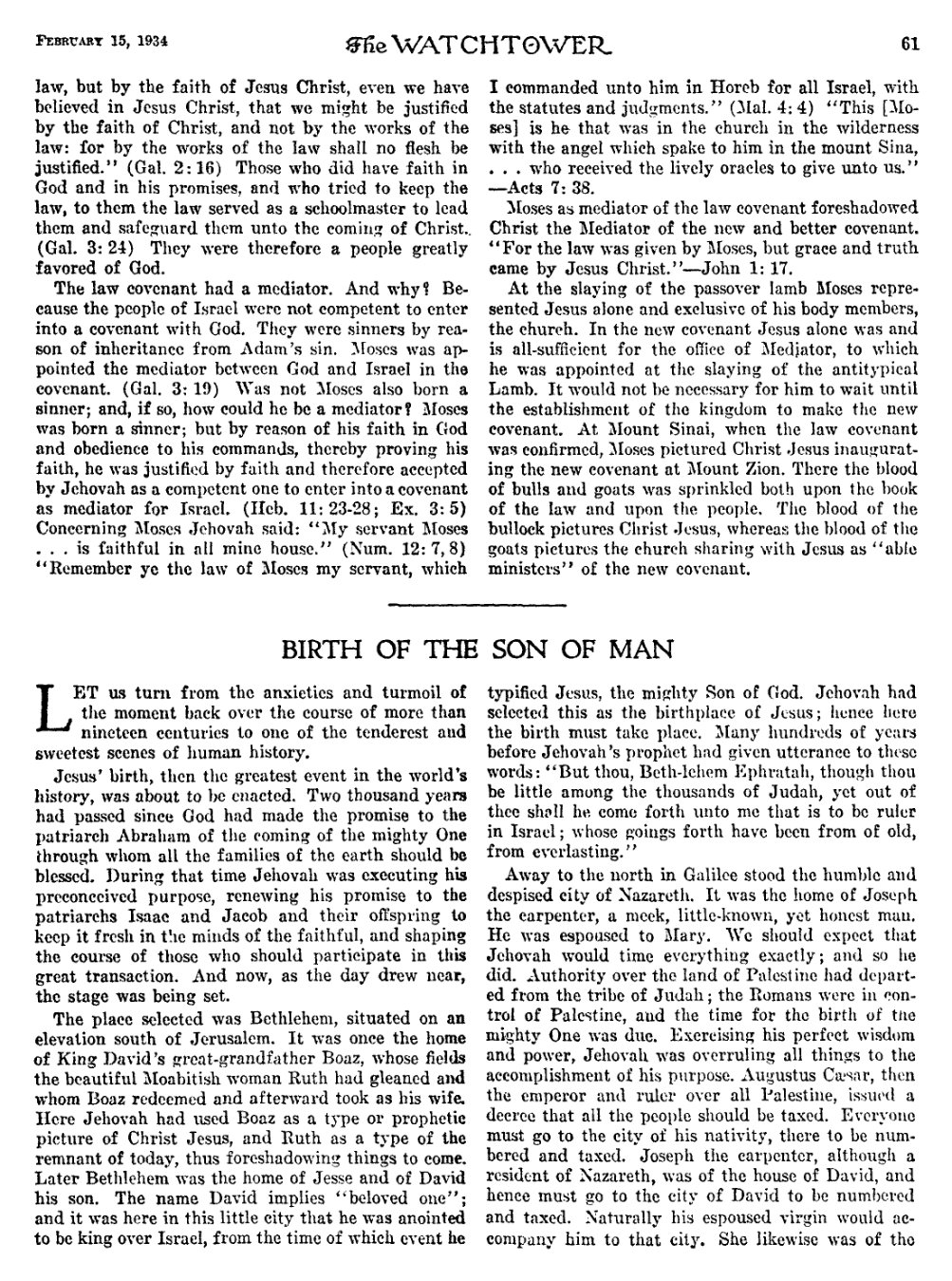This page has not been proofread
law, but by the faith of Jesus Christ, even we have believed in Jesus Christ, that we might be justified by the faith of Christ, and not by the works of the law: for by the works of the law shall no flesh be justified."(Gal. 2:16) Those who did have faith in God and in his promises, and who tried to keep the law, to them the law served as a schoolmaster to lead them and safeguard them unto the coming of Christ. (Gal. 3:24) They were therefore a people greatly favored of God.
The law covenant had a mediator. And why? Because the people of Israel were not competent to enter into a covenant with God. They were sinners by reason of inheritance from Adam's sin. Moses was appointed the mediator between God and Israel in the covenant. (Gal. 3:19) Was not Moses also born a sinner; and, if so, how could he be a mediator? Moses was born a sinner; but by reason of his faith in God and obedience to his commands, thereby proving his faith, he was justified by faith and therefore accepted by Jehovah as a competent one to enter into a covenant as mediator for Israel. (Heb. 11:23-28; Ex. 3:5) Concerning Moses Jehovah said: "My servant Moses ... is faithful in all mine house." (Num. 12:7,8) "Remember ye the law of Moses my servant, which I commanded unto him in Horeb for all Israel, with the statutes and judgments." (Mal. 4:4) "This [Moses] is he that was in the church in the wilderness with the angel which spake to him in the mount Sina, . . . who received the lively oracles to give unto us."-Acts 7:38.
Moses as mediator of the law covenant foreshadowed Christ the Mediator of the new and better covenant. "For the law was given by Moses, but grace and truth came by Jesus Christ."—John 1:17.
At the slaying of the passover lamb Moses represented Jesus alone and exclusive of his body members, the church. In the new covenant Jesus alone was and is all-sufficient for the office of Mediator, to which he was appointed at the slaying of the antitypical Lamb. It would not be necessary for him to wait until the establishment of the kingdom to make the new covenant. At Mount Sinai, when the law covenant was confirmed, Moses pictured Christ Jesus inaugurating the new covenant at Mount Zion. There the blood of bulls and goats was sprinkled both upon the book of the law and upon the people. The blood of the bullock pictures Christ Jesus, whereas the blood of the goats pictures the church sharing with Jesus as "able ministers" of the new covenant.
BIRTH OF THE SON OF MAN
Let us turn from the anxieties and turmoil of the moment back over the course of more than nineteen centuries to one of the tenderest and sweetest scenes of human history.
Jesus' birth, then the greatest event in the world's history, was about to be enacted. Two thousand years had passed since God had made the promise to the patriarch Abraham of the coming of the mighty One through whom all the families of the earth should be blessed. During that time Jehovah was executing his preconceived purpose, renewing his promise to the patriarchs Isaac and Jacob and their offspring to keep it fresh in the minds of the faithful, and shaping the course of those who should participate in this great transaction. And now, as the day drew near, the stage was being set.
The place selected was Bethlehem, situated on an elevation south of Jerusalem. It was once the home of King David's great-grandfather Boaz, whose fields the beautiful Moabitish woman Ruth had gleaned and whom Boaz redeemed and afterward took as his wife. Here Jehovah had used Boaz as a type or prophetic picture of Christ Jesus, and Ruth as a type of the remnant of today, thus foreshadowing things to come. Later Bethlehem was the home of Jesse and of David his son. The name David implies "beloved one"; and it was here in this little city that he was anointed to be king over Israel, from the time of which event he typified Jesus, the mighty Son of God. Jehovah had selected this as the birthplace of Jesus; hence here the birth must take place. Many hundreds of years before Jehovah's prophet had given utterance to these words: "But thou, Beth-lehem Ephratah, though thou be little among the thousands of Judah, yet out of thee shall he come forth unto me that is to be ruler in Israel; whose goings forth have been from of old, from everlasting."
Away to the north in Galilee stood the humble and despised city of Nazareth. It was the home of Joseph the carpenter, a meek, little-known, yet honest man. He was espoused to Mary. We should expect that Jehovah would time everything exactly; and so he did. Authority over the land of Palestine had departed from the tribe of Judah; the Romans were in control of Palestine, and the time for the birth of the mighty One was due. Exercising his perfect wisdom and power, Jehovah was overruling all things to the accomplishment of his purpose. Augustus Caesar, then the emperor and ruler over all Palestine, issued a decree that all the people should be taxed. Everyone must go to the city of his nativity, there to be numbered and taxed. Joseph the carpenter, although a resident of Nazareth, was of the house of David, and hence must go to the city of David to be numbered and taxed. Naturally his espoused virgin would accompany him to that city. She likewise was of the
